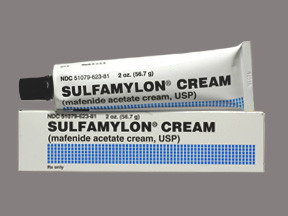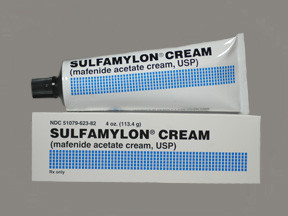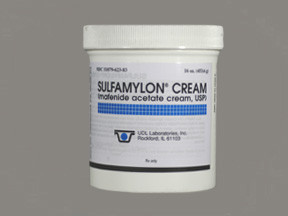MAFENIDE ACETATE CREAM - TOPICAL
PHONETIC PRONUNCIATION: (MAF-en-ide AS-e-tate)
COMMON BRAND NAME(S): Sulfamylon
GENERIC NAME(S): mafenide acetate
Uses
USES: This medication is used alone or with other medications to help prevent and treat wound infections in patients with severe burns. Mafenide is a drug applied to the skin that belongs to a class of drugs known as sulfa antibiotics. It works by killing bacteria that may infect an open wound. Killing bacteria helps to promote wound healing and to decrease the risk of the bacteria spreading to surrounding skin or to the blood, thereby helping to prevent a serious blood infection (sepsis).
How to use MAFENIDE ACETATE CREAM - TOPICAL
HOW TO USE: Wash hands before and after using this medication. Use this medication on the skin only. After cleaning the affected area, apply this medication to the wound while wearing a clean pair of medical gloves (e.g., latex, vinyl), usually once or twice daily or as directed by your doctor. The layer of cream should be about one-sixteenth of an inch (1 to 2 millimeters) thick. The wound should be covered with this medication at all times. Bandages do not need to be used to cover the wound. If some of the cream rubs off the wound, re-apply it right away. Length of treatment is based on your medical condition and response to treatment. Do not stop using this medication until told to do so by your doctor. If possible, bathe at least once a day to help remove the dead skin from the wound to allow healing to occur. Be sure to re-apply this medication after bathing. Use this medication regularly in order to get the most benefit from it. To help you remember, use it at the same time(s) each day. Tell your doctor if your condition persists or worsens or if you notice increasing redness/tenderness of the skin around the wound.
Side Effects
Precautions
Interactions
Overdose
Images
Reviews
Faq for MAFENIDE ACETATE CREAM - TOPICAL
Mafenide Acetate Cream is a topical medication used to treat and prevent infections in burn wounds.
Mafenide Acetate Cream works by inhibiting the growth of bacteria on the skin, particularly those commonly found in burn wounds, thereby preventing infections.
Apply a thin layer of Mafenide Acetate Cream onto the affected area of the burn wound. Gently rub it in to ensure even distribution. Cover the area with sterile gauze dressing if required.
Mafenide Acetate Cream is usually applied 1 to 2 times daily, or as directed by your healthcare provider.
Common side effects may include itching, burning, or stinging sensations at the application site. However, if you experience severe allergic reactions such as rash, swelling, or difficulty breathing, seek immediate medical attention.
Mafenide Acetate Cream is specifically designed for use on burn wounds, particularly those that are not fully healed. It is not recommended for use on open wounds unless prescribed by a healthcare professional.
It is important to consult your healthcare provider before using other medications or creams in combination with Mafenide Acetate Cream to avoid potential interactions or adverse effects.
Yes, Mafenide Acetate Cream is a prescription medication and should only be used under the supervision and guidance of a healthcare professional.
It is crucial to inform your healthcare provider if you are pregnant, planning to become pregnant, or breastfeeding before using Mafenide Acetate Cream. They will weigh the potential risks and benefits before prescribing it.
Disclaimer
IMPORTANT: HOW TO USE THIS INFORMATION: This is a summary and does NOT have all possible information about this product. This information does not assure that this product is safe, effective, or appropriate for you. This information is not individual medical advice and does not substitute for the advice of your health care professional. Always ask your health care professional for complete information about this product and your specific health needs.



No Reviews Yet